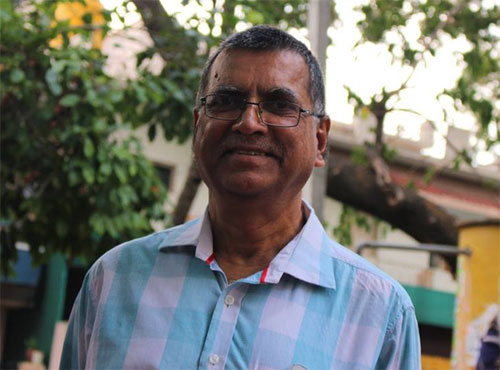-Aaron DSouza, (Barkur), Bengaluru
Personality of the Month
Dr. Kiran Kamal Prasad
We are delighted to present a hidden gem from Barkur, as our Personality of the Month. We were trying to introduce him from long back but he was shying away from any kind of publicity. Finally we got hold of him and were able to get minimum information and are happy to share among our visitors.
Dr. Kiran Kamal Prasad, born on September 16, 1951, in Hosala village in Barkur, has devoted his life to helping the poor and marginalized. He is known for his work with bonded labourers and Dalits.
Early life
Dr. Prasad's journey began during his high school days when he made a profound decision to dedicate his life to helping the poor. This early commitment significantly influenced his academic and professional journey, shaping him into the compassionate advocate he is today.
Dr. Prasad's thirst for knowledge and understanding led him to pursue an impressive array of degrees: a BA, B.Ph, B.Th, MA, NET, LLB, and a PhD from various prestigious institutions. This diverse educational background equipped him with a multifaceted understanding of social issues and the tools to address them effectively.
From 1967 to 1997, Dr. Prasad was part of the Jesuit Order, a period that undoubtedly deepened his commitment to service and social justice. However, feeling a stronger calling towards the issue of bonded labour, he made the bold decision to leave the Order and devote himself fully to promoting the movement on bonded labour, JEEVIKA.
Through his studies and personal experiences, Dr. Prasad arrived at a crucial conclusion that would guide his future work: the best way to serve the poor, especially Dalits and Moolanivasis, was through awareness and organization. He firmly believed that by raising awareness and building leadership among the affected communities, they could address their issues more effectively. This philosophy became the cornerstone of his approach to social change.
Teaching Experiences
Dr. Prasad's career in education has been both diverse and impactful. His teaching journey began in 1975-1976 when he taught Kannada in a high school in Hassan. This experience likely gave him valuable insights into the educational challenges faced by rural students.
From 1979 to 1981, he took on the role of teaching Scriptures in two colleges in Mangaluru and Bengaluru. This period allowed him to explore the intersection of spirituality and social justice, themes that would continue to influence his work.
Between 1987 and 1992, Dr. Prasad served as a Social Anthropology lecturer in Bengaluru. This position undoubtedly deepened his understanding of societal structures and cultural dynamics, knowledge that would prove invaluable in his future work with marginalized communities.
Throughout his career, Dr. Prasad has conducted numerous training sessions on social analysis, leadership, and adult education. These sessions have been crucial in empowering individuals with the knowledge and skills needed to effect change in their communities.
Since 1993, he has expanded his educational efforts to include training activists, bonded labour leaders, and government officials on the issues of bonded labour. This work has been instrumental in creating a network of informed advocates and decision-makers who can address the issue of bonded labour at various levels.
Dr. Prasad's commitment to education extended beyond formal settings. He worked on adult education by bringing out booklets in Kannada, making information accessible to a wider audience. In a particularly innovative move, he developed a five-day spoken English course for children in residential bridge courses. This course was later adapted for Kannada medium students from the 5th standard to the university level. To date, about 100 courses have been conducted for high school, college, and university students, demonstrating Dr. Prasad's belief in education as a tool for empowerment.
Involvement with marginalized groups
One of Dr. Prasad's most significant contributions has been his deep involvement with different marginalized groups. His approach went beyond theoretical understanding; he chose to immerse himself in the lives of these communities.
In 1983-84, Dr. Prasad lived with the Siddis, a community descended from Africans who were brought as slaves by the Portuguese. He spent time in places like Mainally, Mundgod, and Karwar, gaining firsthand insight into their unique challenges and cultural heritage.
From 1985 to 1993, he lived with Dalits in Handenahally and Guddahatti villages in Anekal, Bengaluru. This extended period of immersion allowed him to develop a deep understanding of the daily struggles, aspirations, and resilience of Dalit communities. These experiences undoubtedly shaped his approach to advocacy and empowerment.
Involvement with Bonded Labours
In 1993, Dr. Prasad embarked on what would become his life's most significant work - addressing the issue of bonded labour. He started a state-level movement called JEEVIKA, an acronym for Jeeta Vimukti Karnataka, meaning "Bondage Free Life". This movement has been instrumental in the fight against bonded labour in Karnataka and beyond.
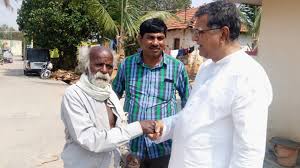
JEEVIKA's work has been both extensive and impactful. The organization has worked tirelessly for the release and rehabilitation of nearly 20,000 bonded labourers, identified in 48 taluks. From 1993 to 1995, individual representations were made to the government for their release and rehabilitation.
The journey was not without challenges. Until 2000, the government repeatedly claimed that there were no bonded labourers at all, dismissing JEEVIKA's findings. However, a turning point came in June 2000 when JEEVIKA highlighted the case of five bonded labourers working in a stone quarry in Hangarahally, Srirangapatttana, Mandya district. This case forced the government to change its stance and begin addressing the issue of bonded labour seriously.
The impact of this shift was significant. In 2001 and 2002, 1,963 bonded labourers were identified and released by the State government. From 2003 to 2005, another 102 bonded labourers were identified and released. The momentum continued, and from 2010 to 2019, JEEVIKA helped 16,155 bonded labourers give representations to the government.
Today, JEEVIKA's reach extends to 17 taluks across 10 districts, as well as 19 other districts in Karnataka. In 2013, the organization expanded its activities to Andhra Pradesh and Tamil Nadu, working in one district each.
To support JEEVIKA's work, the Vimukti Trust was established in 1996. The following year, Dr. Prasad helped form a trade union for bonded laborers and agricultural workers, named "Karnataka Jeetadalu mattu Krashikarmikara Okkuta." This union has been instrumental in helping nearly 25,000 bonded labourers escape bondage, with many becoming active leaders addressing various issues affecting bonded labourers and Dalits.
Dr. Prasad's influence extended to the national level. In 2007, JEEVIKA brought together nearly 40 organisations from 9 states to launch a national platform on bonded labour called National Alliance on Bonded Labour (NABoL). Dr. Prasad was elected its first coordinator, recognizing his leadership in this field.
His expertise was also recognized by the Government of Karnataka, which invited him in 2004 to draw up an action plan for the rehabilitation of bonded Labourers. This plan was approved by the Government in 2007 and widely disseminated in both Kannada and English.
From 2012 to 2014, JEEVIKA led a campaign in collaboration with the National University Delhi to draft new rules under the Bonded Labour Act. These proposed rules were presented to the National Human Rights Commission and the Central Ministry of Labour and Employment for official notification.
In 2013, JEEVIKA joined other groups to promote CEBoLI (Coalition for Eradication of Bonded Labour in India) to demand the notification of the new rules. The same year, Dr. Prasad was appointed as a member of the State Level Committee on Bonded Labour, tasked with reporting to the government on the situation of bonded labour and making suitable recommendations.
Involvement with 'Bitti Chakri'
Dr. Prasad's work extended beyond traditional forms of bonded labour. He also addressed the issue of "Bitti Chakri" (unpaid labour or service) prevalent in all 15 northern districts of Karnataka. A grant-funded census survey on 'Bitti Chakri' was conducted in these districts from February to December 2018, with the findings published in a Kannada booklet in February 2019. This work shed light on a often overlooked form of exploitation, demonstrating Dr. Prasad's commitment to addressing all forms of labour injustice.
Memberships
Dr. Kiran Kamal Prasad has been an active member of several significant organizations throughout his career, allowing him to influence policy and practice at various levels:
- Member of the Karnataka State Child Labour Prevention Project Society (2003-2011)
- Member of the NGO Core Group of the National Human Rights Commission in New Delhi (2006-2011)
- Member of the International Advisory Group for the Slave Route Project of UNESCO in Paris (2006-2008)
- Member of the NHRC Core Group on Bonded Labour (since 2011)
- Member of the Karnataka State High Power Committee on Bonded Labour (since 2011)
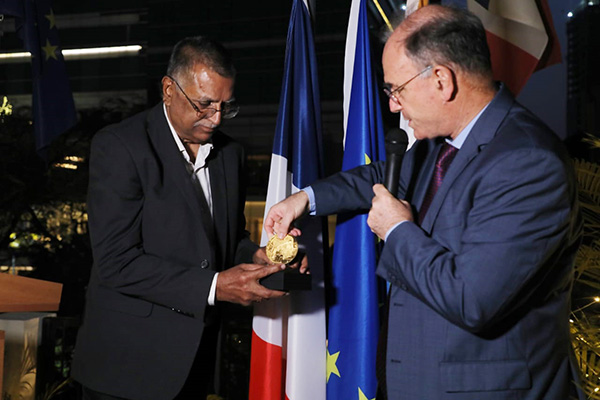
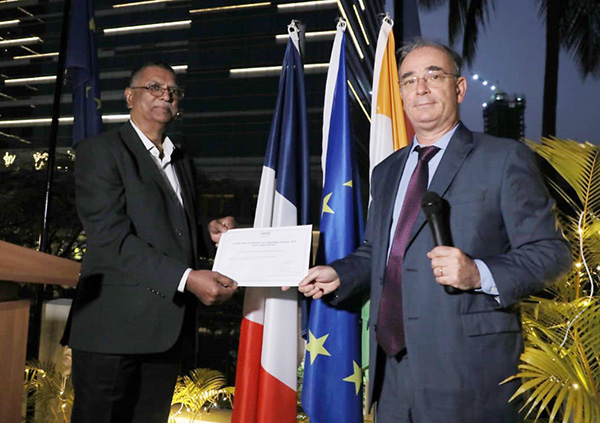
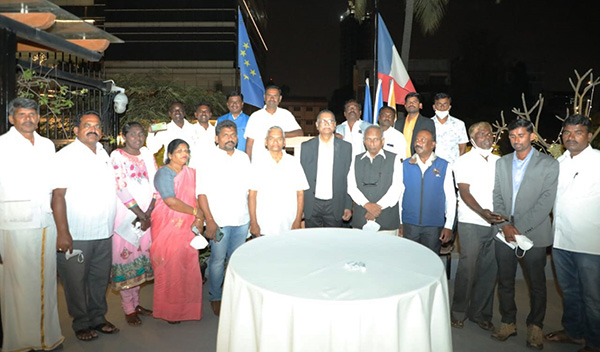
Awards Received
Dr. Prasad's dedication to social justice has earned him and JEEVIKA numerous awards:
- 2008: Human Rights Award from Sri Veerabhadra Chennamalla Swamiji of Nidumaamidi Math
- 2010: Harriet Tubman Freedom Award by Free the Slaves, Washington DC (awarded to JEEVIKA)
- 2019: Mother Theresa Memorial Social Justice Award from the Harmony International Foundation in Mumbai (awarded to JEEVIKA)
- 2020: 'Liberty, Equality, and Fraternity' Human Rights Award from the French Republic (awarded to JEEVIKA)
These awards stand as a testament to the significant impact Dr. Prasad and JEEVIKA have had in the fight against bonded labour and social injustice.
Dr. Kiran Kamal Prasad's life work exemplifies dedication, compassion, and tireless advocacy for the marginalized. From his early decision to serve the poor to his ongoing efforts to eradicate bonded labour, Dr. Prasad has made an indelible mark on the landscape of social justice in India. His multifaceted approach - combining grassroots work, policy advocacy, education, and community organizing - serves as a model for effective social change. As JEEVIKA continues its crucial work, Dr. Prasad's vision of a bondage-free society inches closer to reality, one liberated labourer at a time.

